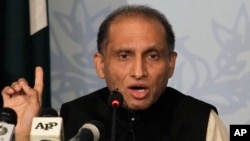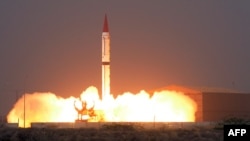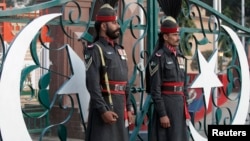Pakistan’s chief negotiator Friday dismissed reports its nuclear arsenal program is the world’s fastest growing, and repeated Islamabad’s demand that it be inducted into a club of nuclear trading nations.
“I think it would be important for us to distinguish between what is propaganda, disinformation and motivated reporting. Pakistan is not in an arms race,” asserted Foreign Secretary Aizaz Chaudhry, addressing a gathering of experts, officials and foreign diplomats in the Pakistani capital.
A recent joint study by the Carnegie and Stimson research organizations estimates that Pakistan has the capability to produce 20 nuclear warheads annually while its archrival, India, appears to be producing about five warheads.
“Pakistan only goes for credible minimum deterrence. We have every right as a state for self-defense. Our nuclear deterrence is for self-defense. It is not status driven,” said Chaudhry.
He again dismissed safety and security concerns about Pakistan’s nuclear weapons, saying the United States “in unambiguous terms” is appreciative of safety measures and steps Islamabad has taken over the past 15 years to prevent proliferation of nuclear materials.
Concerns about increased risk
The U.S. Defense Intelligence Agency director, Lt. General Vincent Stewart, testified before the Senate Armed Services Committee earlier this week that Pakistan continues to take steps to improve nuclear security and is aware of the threat presented by extremists to its program.
But the general noted Islamabad’s nuclear stockpile continues to grow.
“We are concerned that this growth, as well as the evolving doctrine associated with tactical nuclear weapons, increases the risk of an incident or accident,” stated Stewart.
Pakistan insists its “full spectrum” nuclear weapons program is “India-specific” to defend against possible aggression by the larger neighbor.
Officials also maintain that while their long-range nuclear-capable missiles can reach all of India, development of tactical weapons are meant to discourage Indian troops from staging a sudden cross-border aggression.
But U.S. officials are worried the smaller weapons increase chances of an accidental nuclear conflict between India and Pakistan. The two countries have fought three wars since 1947 and their dispute over the divided Kashmir region remains at the center of bilateral tensions.
Nuclear club
Foreign Secretary Chaudhry said Islamabad is aspiring to join the multinational Nuclear Supplies Group and called for both Pakistan and India to be simultaneously given membership.
The 48-nation NSG works to prevent the civilian nuclear trade from being used for military purposes.
Pakistani leaders have been highly critical of the civilian nuclear deal the United States signed with India in 2006 and demand a similar one for Islamabad. Officials appear to be worried about reported diplomatic efforts to get New Delhi into the NSG in the group's meeting set for later this year.
Chaudhry reiterated those concerns in his speech Friday, saying Pakistan needs to be granted NSG membership in accordance with "non-discriminatory" and "criteria-based" policy.
"Strategic stability in South Asia has been negatively impacted by the Indo-U.S. nuclear deal and the discriminatory waiver granted to India by NSG,” Chaudhry said.
Neither India nor Pakistan have signed the Nuclear Non-Proliferation Treaty (NPT), a pre-condition for countries to be inducted into the NSG. However, the group granted New Delhi a “clean waiver” from its existing rules in September 2008.
Critics cite the illicit activities of A.Q. Khan, the founder of Pakistan's nuclear weapons program, and his proliferation network, for hampering Islamabad's attempts to become part of the nonproliferation "mainstream".







